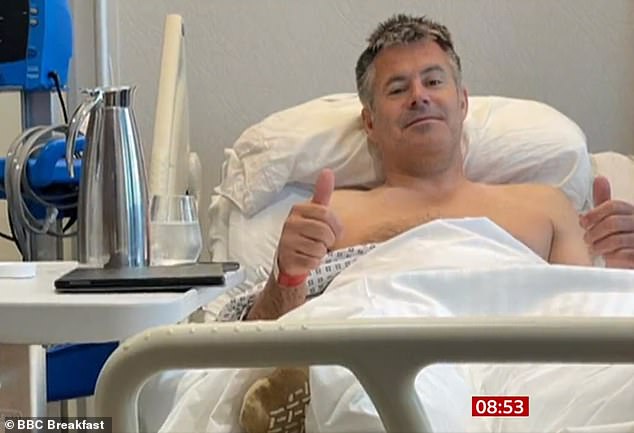- Have YOU got a story? Email tips@dailymail.com
By LILY JOBSON, SHOWBUSINESS REPORTER
Published: | Updated:
Kenny Logan has bravely revealed his sex life struggles with wife Gabby to raise awareness for men who have also had their prostate removed.
Former Scottish rugby international Kenny, 53, was diagnosed with cancer in February 2022 after Gabby, 52, urged him to go to the doctors.
In a candid chat with the Telegraph, Kenny shared erections became ‘impossible’ during his cancer battle which he feared would take a toll on their sex life.
He said: ‘I was forewarned that prostatectomy meant that, at least for a while, getting erections would be impossible. That’s a huge deal for any man.’
‘I never allowed myself to stress “what if they never come back”. Instead, I focused on being fit and cancer-free, I’m relentlessly positive. After about three months, I was relieved to have some movement down there.
‘When it came to sex, things were ‘inconsistent’ let’s say, for a good three months [after that].’


Kenny also explained he used a ‘penis pump’ to to stimulate an erection, which he insists on keeping private in the bedroom.
Vacuum pumps encourage blood to flow to the penis, causing an erection. They work for most men and can be used if medicine is not suitable or does not work, as per the NHS.
He said: ‘It’s certainly not sexy… I used it for 10 minutes a day or so, several times in that first month, grateful Gabby was away working on the Commonwealth Games.
‘I warned her that if she ever walked in on me using it and didn’t back straight out the door, I’d never speak to her again! Some things are private, even in marriage.’
Kenny and presenter Gabby have been married for over 22 years and share two children together.
In February 2023, Kenny spoke candidly about the after-effects of treatment, and said they left him ‘black and blue downstairs’.
Speaking to The Telegraph at the time, he said: ‘Whether it be my dyslexia, my relationship, IVF, we’ve always been quite open. So, I was quite happy to talk about erectile dysfunction and all these other things because I was like, “It is a symptom”.’
‘From a sexual point of view, it’s not consistent. As the surgeon said to me, this could take 18 months.


‘Within a month, I was getting movement, where he says, “That’s amazing”. So it’s just not as consistent. The beauty is you can take a tablet and it changes things.’
He explained that his brave honesty was motivated by his desire to help other people.
Reiterating the need for all men his age to get checked, he said: ‘If I can help one person, that’d be great. But I’ve probably helped a lot of people with the coverage it had.’
The couple said Kenny was ‘extremely lucky’ they caught it early, which afforded him options regarding treatment.
Kenny was inspired to go for a general check up after hearing guests on his wife’s podcast discuss having their hormones tested. And when he did his results showed a high level of PSA – prostate-specific antigen.
‘I got checked and very quickly, within three to four months, I had a biopsy and they said there was something there but they’d keep an eye on it,’ he said.
He said what stood out the most from that appointment was the specialist telling him ’40 per cent of [his] mates have got this [high PSA levels] but don’t know’.
It doesn’t always lead to cancer and many men go their entire lives not knowing.


So when he was diagnosed with prostate cancer a short time later, Kenny recalled it being ‘a huge shock’.
He made the decision to remove the prostate entirely and is now three months post operation feeling almost as good as new.
‘I’m probably about 90 per cent back to normal,’ he said.
Prostate cancer can often be treated if caught early, but symptoms usually do not show up until the cancer is already in advanced states.
It is the most common cancer in men in the UK. The couple are encouraging men to learn more about the disease and consider talking to their GP about the risks.
Every year, upwards of 52,300 men are diagnosed with prostate cancer in the UK – more than 140 every day.
Up to 11,800 men in Britain die from prostate cancer annually, meaning it trails only lung and bowel cancer in yearly fatalities.
WHAT IS PROSTATE CANCER?
How many people does it kill?
More than 11,800 men a year – or one every 45 minutes – are killed by the disease in Britain, compared with about 11,400 women dying of breast cancer.
It means prostate cancer is behind only lung and bowel in terms of how many people it kills in Britain.
In the US, the disease kills 26,000 men each year.
Despite this, it receives less than half the research funding of breast cancer and treatments for the disease are trailing at least a decade behind.
How many men are diagnosed annually?
Every year, upwards of 52,300 men are diagnosed with prostate cancer in the UK – more than 140 every day.
How quickly does it develop?
Prostate cancer usually develops slowly, so there may be no signs someone has it for many years, according to the NHS.
If the cancer is at an early stage and not causing symptoms, a policy of ‘watchful waiting’ or ‘active surveillance’ may be adopted.
Some patients can be cured if the disease is treated in the early stages.
But if it is diagnosed at a later stage, when it has spread, then it becomes terminal and treatment revolves around relieving symptoms.
Thousands of men are put off seeking a diagnosis because of the known side effects from treatment, including erectile dysfunction.
Tests and treatment
Tests for prostate cancer are haphazard, with accurate tools only just beginning to emerge.
There is no national prostate screening programme as for years the tests have been too inaccurate.
Doctors struggle to distinguish between aggressive and less serious tumours, making it hard to decide on treatment.
Men over 50 are eligible for a ‘PSA’ blood test which gives doctors a rough idea of whether a patient is at risk.
But it is unreliable. Patients who get a positive result are usually given a biopsy which is also not fool-proof.
Scientists are unsure as to what causes prostate cancer, but age, obesity and a lack of exercise are known risks.
Anyone with any concerns can speak to Prostate Cancer UK’s specialist nurses on 0800 074 8383 or visit prostatecanceruk.org







